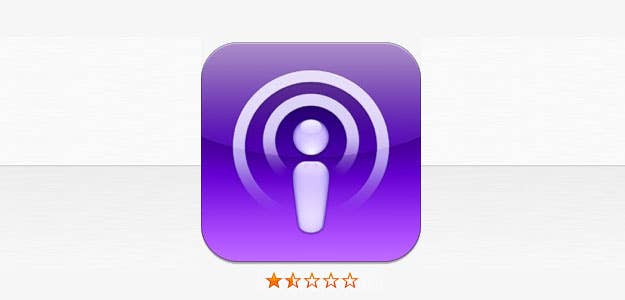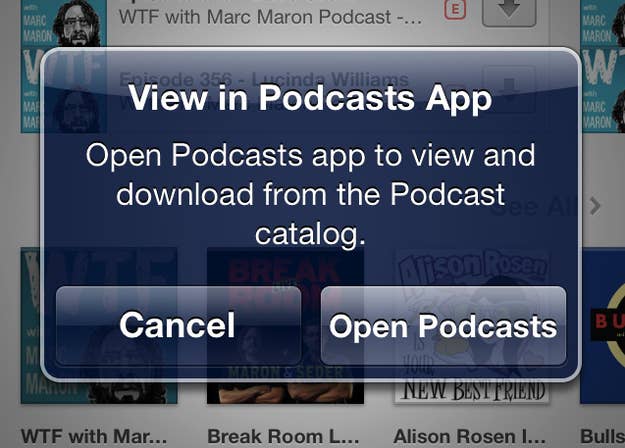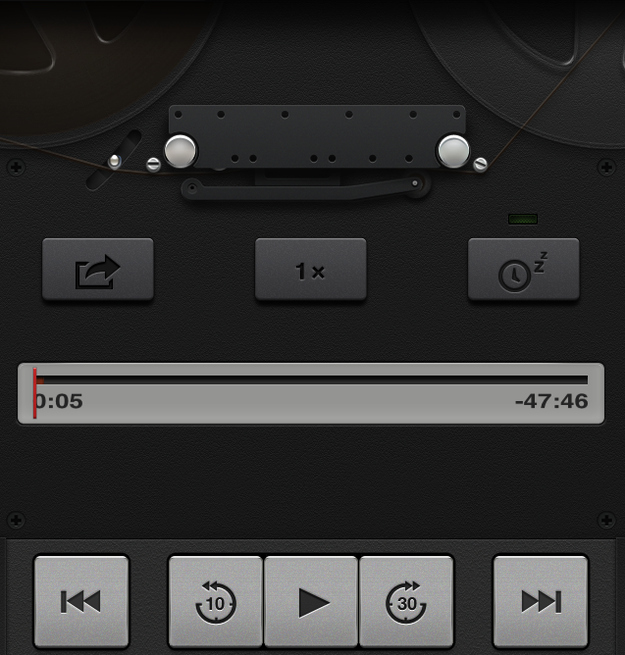
Apple's podcast app is, without a doubt, the worst iOS app it's ever made. Others have been poorly received or largely ignored, but this is unprecedented: With nearly 6,000 ratings, the app has just 1.5 stars in the App Store. Reviews range from harsh to despairing: "Horrible in every way," reads the most recent. "Oh, and this app cost me $40 in overage uses on my data plan."
"To say that it is not user friendly is an egregious understatement," reads another. "Can we please see the whole title of the episodes?!? Is that too much to ask?" Other reviews complain of constant crashes, deleted podcasts, and a confusing interface.
Among the most damning reviews: "Worse than iOS Maps."
Episodic online radio existed before Apple officially endorsed the "podcast" name. But it wasn't until 2005, when Apple added podcast support to iTunes, that podcasting hit the big time. In iOS, podcasts were first supported via iTunes syncing and then directly through the iTunes app, where they flourished for years. In July, Apple broke them out into their own app — an iBooks-style standalone podcasting app.
This was considered progress by the podcast community, in theory. "I applaud Apple for breaking out podcasts into their own app," says CollegeHumor's Jeff Rubin, host of a popular, long-running comedy podcast called The Jeff Rubin Jeff Rubin Show. "The Apple podcast app makes podcasts more visible, so I'm a big fan of its existence."
Soon after launch, though, it became clear that the app had problems. Business Insider savaged it in a review: "Hopefully Apple fixes all the bugs in the podcast app, because it's reportedly removing podcasts from iOS iTunes, forcing people to use this app isntead. If this is what people have to deal with, it's going to be a disaster."

More than six months later, the problem is unresolved. The app's launch disaster has transformed into an ongoing disaster, not just for users but perhaps for podcasting as a whole.
One popular podcaster and radio personality, who did not wish to be named but we'll call "Dave," said that the "double whammy" of the new iTunes design (iTunes 11) and the new podcast app have turn him off of using iTunes, which is by far his largest outlet, almost completely.
"When the app came out, my downloads went through the roof," he says. But these promising early signs were misleading. The boost in downloads turns out to be the result of "bug" with the app, not a surge in actual listeners. The flaw, which triggered numerous downloads without user consent, wreaked havoc on both listeners' data bills and podcasters' hosting plans. "Our bills for that month were so much higher," says Dave.
The app's long term effects are less clear, but don't appear to have been positive. Dave says his podcast has been growing for a long time across services, and that it's difficult to calculate the negative effect the app may have had on his overall subscriber base. That said, he did notice "a tick down" in listenership, once the download bug was accounted for.
"I've had a few listeners tell me that they've had trouble downloading my podcast to their Apple mobile devices," says the anonymous host of the Dumbass's Guide to Knowledge," a skeptics' podcast, "even though it downloads perfectly to their home computer. I'm in the process of implementing new listening options that will hopefully make it easier and give people a choice of how to listen."

Apple doesn't release podcast listening numbers, and providers themselves are generally reluctant to talk about them because, among other reasons, they depend on Apple for good placement in the iTunes Store and podcast storefront. But Seth McFarland, creator of the popular alternative podcast listening app, Downcast, has certainly felt the effects: He says he saw a noticeable increase in downloads after Apple's Podcasts app was released.
"I was pretty worried about what it would do to the market since I felt like they would provide what 99% of people want or need in a podcast app," he says, "but I do get a lot of feedback in email an on Twitter from users who have moved to Downcast due to frustrations with it."
More worrying, perhaps, is the simple fact that Apple hasn't done anything to fix an app that is so obviously in need of help. The company is not short on resources, but appears to have dedicated virtually none to the app that serves as the sole official way to download podcasts on iOS. "At least for my show, about 80% of the listening comes from Apple devices," says Rubin. One wonders if Apple is treating its podcast app like it did its Remote app, which was reported to have been created by a team of one.
"If Apple really had an interest in pushing it, I bet they could double the number of people consuming podcasts just by redesigning the iTunes store," says Rubin says.
Podcast listeners are starting to feel abandoned, too. A recent review reads: "Crashes... hangs up... utterly useless. Podcasts worked just fine in the music app. Why take something that works and break it for no good reason?"
It's a curious contrast, to be sure. Podcasts have a higher profile now than ever before, and have launched or re-launched careers in spectacular ways — comedian Marc Maron, for example, has parlayed his podcast into a radio show and a TV series on IFC. But as podcasts have become more interesting, Apple seems to have become less interested.
"Apple is by far the #1 most important company in podcasts," says Rubin, "but it seems like a really low priority for them."
Apple has not yet responded to a request for comment.
